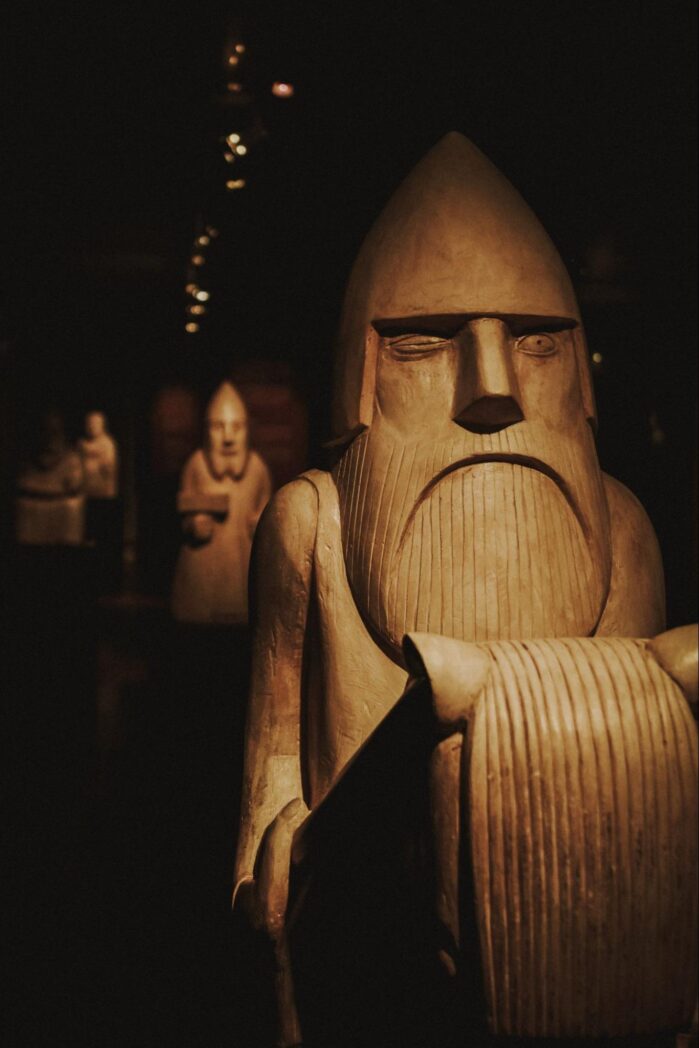Are you interested in exploring a new spiritual path? If you’re drawn towards nature, mythology, and ancient beliefs, then converting to Norse religion could be a fulfilling choice. Through researching and connecting with the Norse community, you can discover a deeper connection to yourself and the world around you. In this article, we’ll explore the key beliefs and practices of Norse religion, reasons for converting, and steps to take to begin your journey.
Understanding Norse Religion
Before diving into the conversion process, it’s important to understand the foundations of Norse religion. This ancient belief system was practiced by the Vikings, who believed in gods and goddesses that represented natural forces, virtues, and qualities.

The Vikings saw their gods and goddesses as powerful beings who could influence their daily lives. They believed that by praying to these deities, they could gain favor and protection.
Key Beliefs and Deities
The Norse pantheon consists of many gods and goddesses, each with their unique attributes and mythology. Odin, the All-Father, is the chief god who presides over war, wisdom, and magic. He is often depicted as a wise old man with a long beard and one eye. Thor, the god of thunder, is a protector of humans and defender against giants. He is known for wielding his powerful hammer, Mjolnir. Freya, the goddess of fertility, love, and war, is known for her beauty and strength. She is often depicted wearing a necklace of amber and riding a chariot pulled by cats.
Alongside these deities, Norse religion also acknowledges other spiritual entities, including elves, dwarves, and giants. These beings were believed to have their own powers and abilities, and were often associated with specific natural phenomena. For example, dwarves were said to be skilled craftsmen, while giants were seen as powerful and dangerous.
The Role of Mythology
Mythology is an essential part of Norse religion, as it tells stories of the gods and their interactions with humans and other beings. These stories were passed down through oral tradition and were eventually written down in the Eddas, a collection of Norse myths.
The Norse creation story is known for the tale of Ymir, the primal giant whose body formed the world. Other myths include the tale of Ragnarok, the epic battle that marks the end of the world. These stories serve as a source of wisdom and inspiration for modern-day practitioners, providing guidance on how to live a meaningful life in tune with spiritual forces.
Modern Interpretations and Revivals
Although Norse religion was practiced primarily by the Vikings, it has gained popularity in recent times as a source of spiritual guidance for individuals around the world. Modern practitioners interpret the myths and beliefs of Norse religion in different ways, with some seeing it as a purely historical religion and others incorporating it into a wider spiritual practice.
Some modern practitioners of Norse religion focus on the warrior aspect of the religion, seeing it as a way to cultivate strength, courage, and honor. Others focus on the connection to nature and the natural world, seeing the gods and goddesses as representations of natural forces.
There are also various groups and organizations that seek to revive the practice of Norse religion in a more traditional form. These groups often hold festivals and rituals, and may use reconstructed versions of ancient Norse practices.
Overall, Norse religion continues to be a source of fascination and inspiration for people around the world. Its myths and deities offer a unique perspective on the human relationship with the natural world and the divine, and its revival in modern times speaks to the enduring power of ancient beliefs and practices.
Reasons for Converting to Norse Religion
People convert to Norse religion for different reasons, including a desire for personal spiritual connection, cultural and ancestral ties, and dissatisfaction with mainstream religions. Let’s explore these ideas further.
Personal Spiritual Connection
If you’re seeking a deeper connection to the natural world and the spiritual forces around you, Norse religion may resonate with you. The belief in gods and goddesses who hold power over natural elements can provide a sense of awe and reverence for the world. Through ritual practices and honoring ancestors, you can cultivate a relationship with the divine that reflects your personal beliefs and values.
Connecting with the natural world is an essential part of Norse religion. The gods and goddesses are not seen as separate from nature but rather integral parts of it. For example, Thor, the god of thunder, is associated with storms and lightning, while Freyja, the goddess of love and fertility, is associated with the earth and its abundance. By connecting with these deities, you can gain a greater appreciation for the natural world and your place in it.
Norse religion also places a strong emphasis on personal growth and development. Through the practice of virtues such as courage, wisdom, and honor, you can become a better version of yourself. This can lead to a sense of purpose and fulfillment that may be lacking in other areas of your life.
Cultural and Ancestral Ties
For people with ancestral ties to Viking culture or Scandinavian countries, converting to Norse religion can offer a way to connect with their heritage and honor their ancestors. It can serve as a way to learn about their history and cultural traditions in a deeper way.
The Viking Age was a time of great exploration and expansion, and the Norse religion played a significant role in shaping the culture and values of the people who lived during that time. By studying Norse mythology and practicing the religion, you can gain a greater understanding of your cultural heritage and the values that your ancestors held dear.
Norse religion also places a strong emphasis on community and kinship. By connecting with other people who share your cultural background and religious beliefs, you can form deep and meaningful relationships that can last a lifetime.
Dissatisfaction with Mainstream Religions
Some people who convert to Norse religion may feel disillusioned with mainstream religions and seek a spiritual path that aligns more closely with their values and beliefs. Norse religion emphasizes self-reliance, courage, and strength, which may resonate with those who feel that mainstream religions have become too focused on dogma and rules.
Norse religion is not prescriptive in the same way that many mainstream religions are. There is no set of commandments or rules that you must follow. Instead, you are encouraged to develop your own personal relationship with the gods and goddesses and to live your life in a way that reflects your values and beliefs.
Additionally, Norse religion places a strong emphasis on personal responsibility. You are responsible for your own actions and must face the consequences of your choices. This can be empowering for those who feel that mainstream religions place too much emphasis on external authority figures.
In conclusion, people convert to Norse religion for a variety of reasons, including a desire for personal spiritual connection, cultural and ancestral ties, and dissatisfaction with mainstream religions. Whatever your reason for exploring Norse religion, it can offer a unique and fulfilling spiritual path that can help you connect with the natural world, honor your heritage, and live a life that reflects your values and beliefs.
Steps to Convert to Norse Religion
The process of converting to Norse religion involves research, connection with the Norse community, participation in rituals and practices, and honoring the gods and ancestors. Let’s explore these steps in more detail.
Step 1: Research and Education
Before fully committing to a spiritual path, it’s important to research and educate yourself on Norse religion. Read books and articles, attend events and classes, and seek out mentors who can guide you on your journey.
Step 2: Connecting with the Norse Community
Connecting with other practitioners can provide a supportive network and a sense of belonging. Attend gatherings and events, join online communities, and seek out groups online or in person.
Step 3: Participating in Rituals and Practices
Participating in rituals and practices can help you connect with the divine and honor the gods and ancestors. These may include offerings, meditations, and celebrations of holidays and festivals.
Step 4: Honoring the Gods and Ancestors
Central to Norse religion is the concept of honoring one’s ancestors and the gods. This can involve setting up an altar or sacred space in your home, making offerings to the gods and ancestors, and performing rituals to connect with them.
Living a Norse Pagan Lifestyle
Converting to Norse religion involves incorporating Norse values into your daily life and celebrating holidays and festivals. Let’s explore some ways to live a Norse pagan lifestyle.
Incorporating Norse Values into Daily Life
Norse values emphasize courage, strength, honor, and self-reliance. Living a Norse pagan lifestyle involves embodying these values in your daily actions and decisions. This may include acts of bravery, helping others in need, or pursuing personal goals with determination.
Celebrating Norse Holidays and Festivals
Norse pagans celebrate holidays and festivals that mark the changing seasons and honor the gods and ancestors. These may include Yule, the winter solstice celebration, or Midsummer, the celebration of the summer solstice.
Creating a Home Altar or Sacred Space
Creating a home altar or sacred space can provide a focal point for connection with the gods and ancestors. It can include symbols of the gods, offerings, and other decor that reflects your personal beliefs and aesthetic.
Conclusion
Converting to Norse religion is a deeply personal choice that requires research, education, and a commitment to connecting with spiritual forces. Through understanding the key beliefs and practices of Norse religion, and finding ways to incorporate them into your daily life, you can embark on a fulfilling journey of spiritual exploration and personal growth.


No Responses